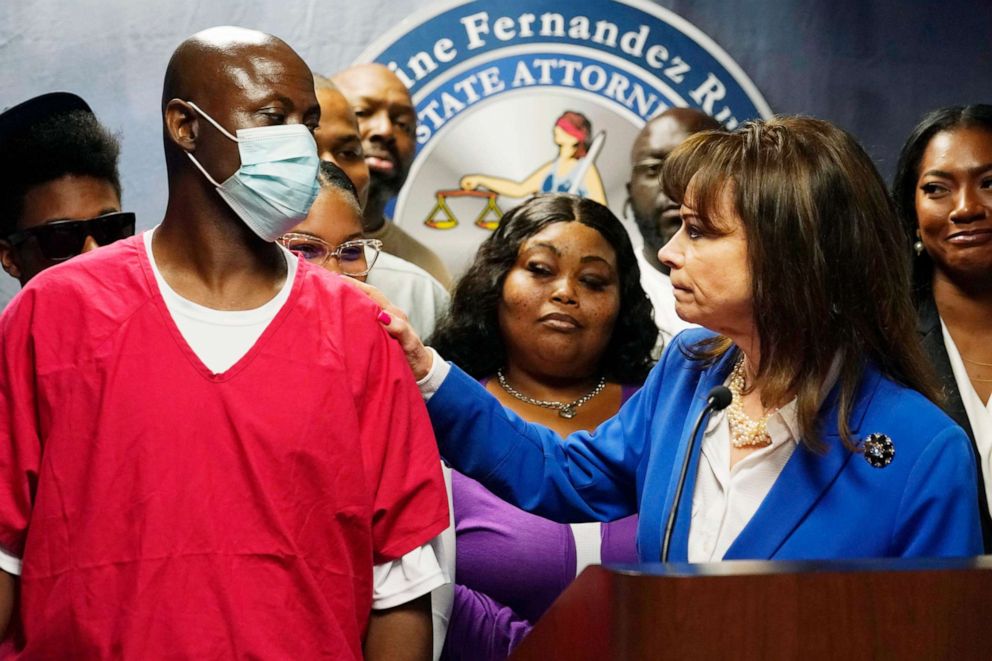Wrongfully convicted Thomas Raynard James, imprisoned for over 30 years, speaks out
"I knew this day was coming," he said about his release.
After serving 31 years in Florida State Prison for a murder he did not commit, Thomas Raynard James is a free man.
"Emotionally I was overwhelmed. I was not in a state of disbelief, because I knew this day was coming, eventually. I was looking forward to it. But emotionally I wasn't really prepared for it," James told ABC News.

James was convicted in 1991, when he was 23, for the 1990 death of Francis McKinnon.
Witnesses told police the robbery and murder of McKinnon was committed by a man named "Thomas James" or "Tommy James." James was convicted after a witness then told jurors she saw James kill her stepfather during a robbery, due to what his lawyer called a case of mistaken identity.
According to the state attorney for Miami-Dade County Katherine Fernandez Rundle, the case lacked physical evidence and his fingerprints did not match those found at scene but he was still convicted after an eyewitness said she saw him shoot McKinnon.
James was convicted of first-degree murder and sentenced to life in prison.
"It was horrendous ...To have somebody to be incarcerated can be dramatic in of itself, but to know that you're sitting here, and you're going through these days on a daily basis for something that you didn't have anything to do with, it was torture," James says.
James said he "never gave up" thinking that he would eventually be released, but says that life in prison had been difficult.
"It's hard to even put into words, some of the things that I had to deal with and the feelings that I was dealing with for the last over three decades," he said.
James said he spent years filing motions proclaiming his innocence and was denied many times. He said he had even reached out twice to The Innocence Project in Florida, and was told both times they could not "proceed with his case."
Attorney Natlie Figgers who specializes in personal injury and family law, took on James' case pro bono out of a legal "duty," she said.
"Once I saw the evidence and reviewed the case, it was pretty clear that a mistake had occurred, and I was pretty flabbergasted that he submitted that many appeals and they didn't see the same thing… when you hear that it's just mistaken identity due to a name. How can somebody be wrongfully convicted just based on having the same name?" Figgers told ABC News.
"I was a personal injury attorney, so I never dealt with criminal law. So I definitely want to make sure that it was something that I would be able to prove on his behalf ... There were no other attorneys that were taking this case on at that time. So I felt like I had a duty," she added.
The witness whose testimony placed James behind bars recanted her previous testimony last month, according to Rundle.
While he is a free man now, supporting himself and finding a job could be difficult. James’ family has even launched an online fundraising campaign for him.
Figgers said she is pursuing a civil wrongful imprisonment case, seeking compensation for James.
James said he plans on becoming "gainfully employed," and also said he is working on a book about his story.
He said he hopes to help others in similar situations, but said he is most focused on making up for lost time.
"The list of things that I missed out on is long. For me, one thing that would mention is that I lost a lot of family, a lot of friends… they went to their grave with me still sitting in prison for a crime I didn't commit," James said.
"Injustice to anyone is injustice to everyone. So when people such as myself are crying out don't just brush them off and automatically call them guilty," he said.



